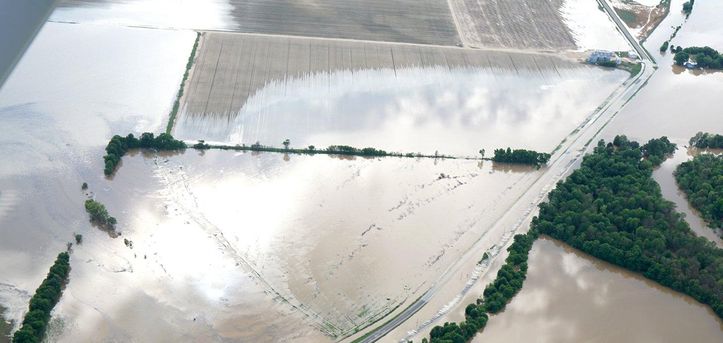Groundbreaking held for Grand Prairie Irrigation Project
by May 10, 2021 12:23 pm 1,255 views

The USDA’s Natural Resources Conservation Service (NRCS) and the White River Irrigation District hosted a groundbreaking ceremony Friday (May 7) west of DeValls Bluff for the first phase of construction of the Grand Prairie Irrigation Project. The groundbreaking marked the beginning of construction on the first series of canals that will deliver water from the White River to irrigate roughly 37,800 acres of cropland upon completion.
“We want to thank the White River Irrigation District for their leadership and persistence on this project over the years,” said Arkansas NRCS State Conservationist Mike Sullivan. “This has been a very challenging project. If not for the leadership, ingenuity, and persistence of the irrigation district and their staff, with strong support from the state of Arkansas, Gov. Asa Hutchinson, the Arkansas Congressional delegation, the U.S. Army Corps of Engineers, Arkansas Department of Agriculture and NRCS, this project would never have progressed to this point.”
Arkansas NRCS has received $48 million in federal funds to be used with local funding available to construct several segments of the project and pipelines so the irrigation district can begin delivering water, Sullivan added.
“This initial section will construct the first two miles of canals. Overall, this project will greatly reduce the rate of groundwater withdrawal and allow farmers to continue to be productive, growing more rice than any other state, as well as other crops, all while reducing their pumping costs,” he said.
Once completed, the Grand Prairie Irrigation Project, in portions of Arkansas, Lonoke, Monroe and Prairie counties, will provide continued irrigated production on 245,400 acres of cropland. Agricultural water management will increase irrigation efficiencies and provide supplemental water for agricultural crops utilizing the White River as the surface water source. Other benefits include energy savings and increased yields due to the increased managed use of surface water.
NRCS serves as a technical adviser to project sponsors because of its engineering and environmental expertise and ability to deliver science-based technology and knowledge about the watershed’s natural resources and ecosystem.
Funding for the project is being provided through the PL83-566 Watershed Program. The Watershed Protection and Flood Prevention Program helps units of federal, state, local and tribal of government (project sponsors) protect and restore watersheds up to 250,000 acres.
“Today is a huge milestone towards delivering affordable water to our farmers across the White River Irrigation District,” said Dan Hooks, White River Irrigation District president. “The progress we have made over the course of the last few years has put us on the right path towards our ultimate goal of improved efficient and sustainable irrigation practices here on the Grand Prairie.
Since 1954, the Watershed Protection and Flood Prevention Program has helped communities address critical needs on flood control, water management, watershed protection and development. This strong federal, state and local partnership has resulted in the construction of more than 2,000 watershed projects that help communities across the nation. These watershed projects reflect a federal investment of about $6.2 billion and deliver an estimated $2.2 billion in average annual benefits nationwide.
In Arkansas, there have been 35 completed watershed projects. Included in these 35 projects are 209 small- and medium-size flood control dams and hundreds of miles of flood control drainage ditches. Built by NRCS, in partnership with local watershed districts, these earthen dams and ditches provide an average annual benefit of over $51 million from the reduction in flooding.
In 2020, NRCS announced that it was investing in one existing and three new multi-year projects (including the Grand Prairie Irrigation Project) in Arkansas that will build vital infrastructure and conserve natural resources. The other projects are Bayou Meto Irrigation Project, the West Fork of the White River Watershed Project and the Departee Creek Watershed Project.
